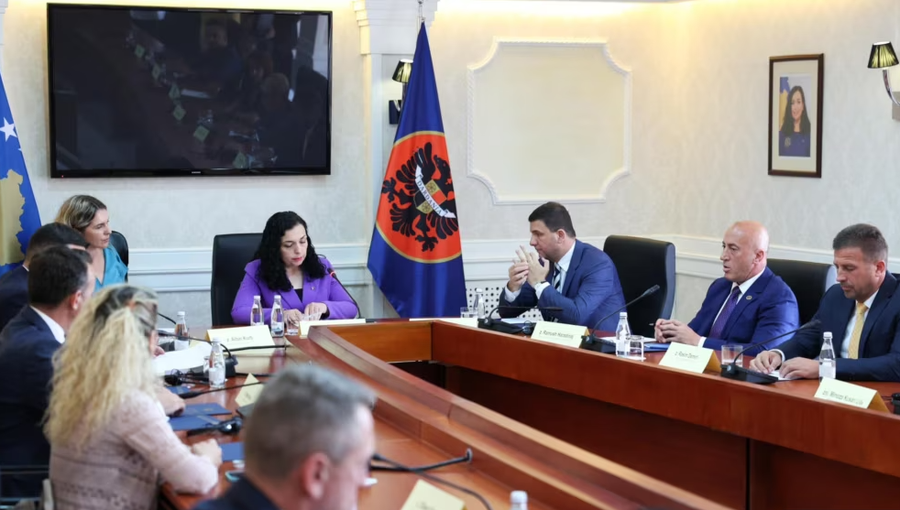
President Vjosa Osmani began meetings with the heads of parliamentary parties on Thursday, in an attempt to unblock the political impasse, following the successive failures of MPs to constitute the Kosovo Assembly, even three months after the parliamentary elections.
The meeting - which began shortly after 1:00 PM in the president's office - is being attended by Albin Kurti of the Vetëvendosje Movement, Memli Krasniqi of the Democratic Party of Kosovo, Lumir Abdixhiku of the Democratic League of Kosovo, and Ramush Haradinaj of the Alliance for the Future of Kosovo.
After meeting with the heads of Albanian parties, Osmani will hold talks with minorities at 3:00 PM.
The meeting comes on the day when MPs failed to constitute the Assembly even on the sixteenth attempt - exactly one month after the efforts began - due to political divisions. The constitution of the Assembly is necessary to pave the way for the formation of the new Government.
The winning party, the Vetevendosje Movement, is failing to secure the 61 votes needed to elect Albulena Haxhiu to the position of Speaker of the Parliament.
Haxhiu is seen by the Democratic Party of Kosovo (PDK) and the Alliance for the Future of Kosovo (AAK) as a "divisive figure," while the Democratic League of Kosovo (LDK) says it will not support any Vetëvendosje candidate for speaker of parliament.
Vetëvendosje insists that Haxhiu deserves to be elected and, although it has sought political agreements with other parties, has ruled out the possibility of bringing forward another candidate besides itself.
The creation of new institutions requires reaching some kind of political agreement, given that no party has won the majority to govern alone.
Vetëvendosje invited 48 seats, PDK 24, LDK 20, the AKK-NISMA coalition 8, Serbian List 9, the Party for Justice and Survival 1 and non-Serb minorities 10.
Osmani warned on Tuesday that there could be a series of meetings between her and the political parties, depending on how the talks go on Thursday.
She said that failing to constitute the Assembly jeopardizes "precisely the constitutional functioning of the institutions, which is also the reason why I have invited the leaders to discuss the way forward."
"As an institution of the Presidency, we are implementing constitutional duties, because, as you know, Article 84 determines that the president of the country has the duty to guarantee the constitutional functioning of institutions," she said.
Meanwhile, Bodo Weber, a senior fellow at the non-governmental Council for Democratization Policies in Berlin, told Radio Free Europe that "in the current crisis, the only way out is the strong engagement of the West, that is, of Europe."
"However, unlike all previous crises since 2010, this commitment is lacking, because Western policy, that of the EU towards Kosovo, is in a transitional phase of a strategic vacuum after the complete collapse of political dialogue and the lack of leadership from the capitals of the most important member states. For this reason, it seems to me that this political and institutional crisis is the deepest since the declaration of independence," he said.
According to him, the current institutional crisis in Kosovo is, on the one hand, the result of the escalation of relations between the outgoing ruling party, the Vetevendosje Movement, and the opposition parties – for which, in addition to the Kurti Government, “the bearers of the political dialogue over the last four years, namely the Franco-German initiative and especially Germany, also bear great responsibility; and on the other hand, this crisis stems from the unfinished character of the political, institutional and constitutional order of the Republic of Kosovo – for which all actors are responsible: the local political elites and the Western actors who were involved in the constitutional process in 2007-2008”.
"This incompleteness of the political and institutional system comes to light every time the country faces regular political crises," he assessed.
On the eve of Thursday's meeting, Osmani met with the chargé d'affaires of the United States Embassy in Pristina, Anu Prattipati.
The presidency said in a press release that this was a regular meeting between them and that they discussed "the importance of establishing Kosovo's institutions as soon as possible and the consequences that our country faces due to this delay."/ REL (A2 Televizion)











